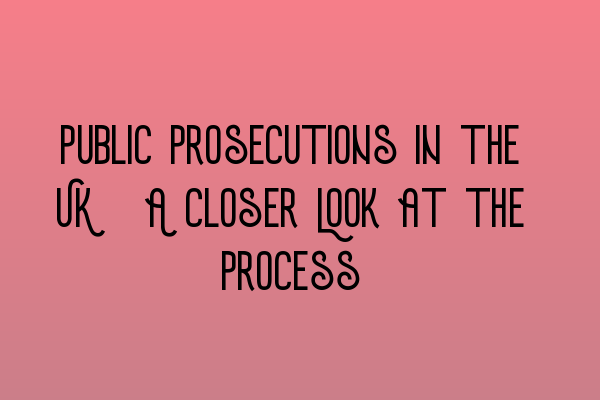Public Prosecutions in the UK: A Closer Look at the Process
In the United Kingdom, public prosecutions play a crucial role in maintaining law and order. Understanding the process behind such prosecutions is essential for individuals involved in the criminal justice system. This article aims to provide a closer look at the process of public prosecutions in the UK.
The Role of the Crown Prosecution Service (CPS)
When it comes to public prosecutions, the Crown Prosecution Service (CPS) is at the heart of the process. The CPS is responsible for reviewing the evidence gathered by the police and deciding whether to proceed with criminal charges. They work in close collaboration with the police to ensure that cases are prepared thoroughly and presented effectively in court.
To better understand the intricacies of this process, it is important to be aware of the various stages involved:
Investigation and Arrest
The first stage in a public prosecution involves the investigation and subsequent arrest of a suspect. Police officers gather evidence, interview witnesses, and collect any other relevant information. The decision to arrest is made based on this evidence and the strength of the case.
During this stage, it is crucial for officers to adhere to legal procedures and guidelines. Failure to do so may result in the evidence being deemed inadmissible in court, potentially jeopardizing the case.
Evidence Review
Once a suspect is arrested, the police submit the evidence collected during the investigation to the CPS. This evidence is thoroughly reviewed by expert prosecutors who assess its credibility and strength. They consider factors such as witness statements, forensic evidence, and any other relevant materials.
The prosecution team evaluates the likelihood of securing a conviction based on the available evidence. This assessment helps them determine whether to proceed with formal charges or discontinue the case due to insufficient evidence.
Charging Decision
If the CPS believes that there is sufficient evidence to support a conviction, they proceed to charge the suspect. The decision to charge is made based on the legal test of “a realistic prospect of conviction” and whether it is in the public interest to proceed.
It is important to note that the CPS operates in accordance with the Code for Crown Prosecutors, which provides clear guidance on making charging decisions. This ensures fairness, consistency, and adherence to the principles of justice.
Court Proceedings
Once the suspect has been charged, the case moves to court proceedings. The prosecution presents their case, presenting the evidence and calling witnesses if necessary. The defense has the opportunity to challenge the evidence and present their own case.
The trial process includes examination and cross-examination of witnesses, presentation of evidence, and closing arguments. The judge or jury ultimately decides whether the defendant is guilty or not guilty based on the evidence presented.
Throughout the trial, the CPS maintains an active role, ensuring that the prosecution case is effectively presented and that the interests of justice are served.
Involvement of Defense Barristers
It is important to mention the role of defense barristers in public prosecutions. Defense barristers serve as advocates for the accused, carefully analyzing the prosecution’s case and presenting their own arguments in court. They cross-examine witnesses, challenge evidence, and work diligently to protect the rights of their clients.
By providing a balanced approach to the proceedings, defense barristers play a vital role in safeguarding the fairness of the trial and ensuring the integrity of the criminal justice system.
Conclusion
Public prosecutions in the UK are multifaceted, involving comprehensive investigations, evidence reviews, charging decisions, and court proceedings. The Crown Prosecution Service (CPS) acts as the central authority responsible for reviewing evidence and making charging decisions based on the strength of the case.
It is essential for all individuals involved in the criminal justice system to have a clear understanding of the process behind public prosecutions. By familiarizing themselves with the stages outlined in this article, they can better navigate their roles and responsibilities.
To learn more about criminal law and the SQE exams, please explore our related articles:
- SQE 1 Practice Exam Questions
- SQE 1 Practice Mocks FLK1 FLK2
- SQE 2 Preparation Courses
- SQE 1 Preparation Courses
- SRA SQE Exam Dates
